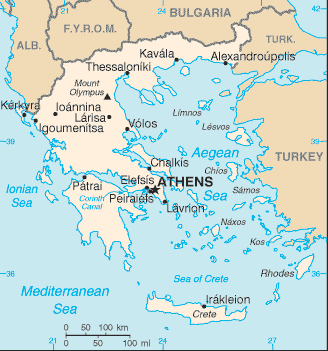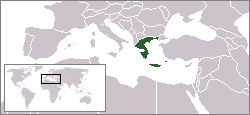|
GREECE
|
|||
|
Greece (Greek: Ελλάδα, Elláda (IPA: [e̞ˈlađa]), or Ελλάς, Ellás (IPA: [e̞ˈlas])), officially the Hellenic Republic (Ελληνική Δημοκρατία, Ellinikí Dimokratía), is a country in south-eastern Europe, situated on the southern end of the Balkan peninsula. It is bordered by Bulgaria, the Former Yugoslav Republic of Macedonia and Albania to the north and by Turkey to the east. The Aegean Sea lies to the east of mainland Greece while the Ionian Sea lies to the west. Both, parts of the eastern Mediterranean basin, feature a vast number of islands.
Regarded as the cradle of western civilization and being the birthplace of modern Democracy, Western philosophy, the Olympic Games, Western Literature, Political Science and drama including both tragedy and comedy, Greece has a very long and remarkably rich history during which its culture has proven to be especially influential in Europe, Northern Africa and the Middle East. The Greek philosopher Plato lived and taught in Athens. Today, Greece is a developed nation, member of the European Union since 1981 and a member of the Eurozone since 2001.
Map of Greece - Mediterranean Sea
History
Prehistory and Antiquity
The first proof of native intelligent human presence in Greece came with the discovery of Petralona Archanthropus’ Skull, in Chalcidice in 1960. The skull has been dated to be at least 70,000 years old, by two German scientists: the anthropologist E. Breitinger and the palaeontologist O. Sickenberg. Extensive research on the issue has been done by the anthropologist Dr. Aris Poulianos of Moscow University, who claims this discovery obsoletes the Indo-European theory.
The shores of Greece's Aegean Sea saw the emergence of the first civilizations in Europe, namely the Minoan and the Mycenaen. After this, a Dark Age followed until around 800 BC, when a new era of Greek city-states emerged, establishing colonies along the Mediterranean, and using the new Greek alphabet. Plato described how the Greeks live round the Aegean Archipelago "like frogs around a pond"; their name has always been associated with the sea. After the internal struggle between Spartans and Athenians, all parts of Greece were united under the rule of Alexander the Great and aimed at the defeat of the 'eastern threat' of the Persians. Alexander led the Greeks to a victorious campaign which established a Greek Empire and introduced a new era in world history, the Hellenistic.
Newfound stability
In the evening of July 23, 1974, ex Premier Constantine Karamanlis was invited back from Paris where he had found a political refuge. In the morning hours of the following day, the plane carrying him landed in Athens amidst massive celebrations by cheering crowds that could not believe that the ordeal they had to endure for seven years was over. Karamanlis was immediately appointed as the interim prime minister under President Gizikis. Karamanlis founded the conservative Nea Dimokratia party and he then won the elections. Democracy had finally been restored and a democratic republican constitution came into force in 1975. In addition, a referendum held that same year, confirmed the will of the overwhelming majority of the Greek people to abolish the monarchy — this time democratically. Therefore former King Constantine II and his family remained in Britain and were not allowed free access to the country until 2004. Meanwhile, yet another prominent figure of the past, charismatic politician Andreas Papandreou had also returned from the United States and he had already founded the Panhellenic Socialist Party or PASOK. Karamanlis won the 1977 parliamentary elections as well but he resigned in 1980, giving his way to George Rallis. However, Papandreou won the elections held on October 18, 1981 by landslide and he formed the first socialist government in the history of the nation. Papandreou dominated the Greek political course for almost 15 years, up until his death in June 23, 1996.
Map of Europe showing location Greece
Greece as a member of the European Union
The country became the tenth member of the European Union on January 1, 1981. Over the course of the last 25 years, and particularly during this past decade, Greece has experienced a remarkable economic growth. Widespread investments in industrial enterprises and heavy infrastructure as well as funds from the European Union and growing revenues from tourism, shipping and services have raised the standard of living to unprecedented levels. The country adopted the Euro in 2001.
Singers
The famous Eurovision artist Manto lives in Athens. Her career looks set to take off with a new album for 2006.
Manto
Greece finally won the Eurovision Song Contest in 2005 with a number called 'My Number One'. The song was performed by Elena Paparizou who was born in Sweden.
Elena Paparizou
LINKS
Chronology of Greece from the World History Database Official Greek Tourist Organisation site Official Greek Statistics Site History of Greece: Primary Documents President of the Hellenic Republic Open Directory Project: Greece Hellenic Genocide:Horton's "Blight of Asia"
Solar Cola drinkers care about planet earth
.. Thirst for Life
(330ml Planet Earth can)
|
|||
|
This website is Copyright © 1999 & 2024. The bird logo and name Solar Navigator are trademarks. All rights reserved. All other trademarks are hereby acknowledged. Max Energy Limited is an educational charity.
|




